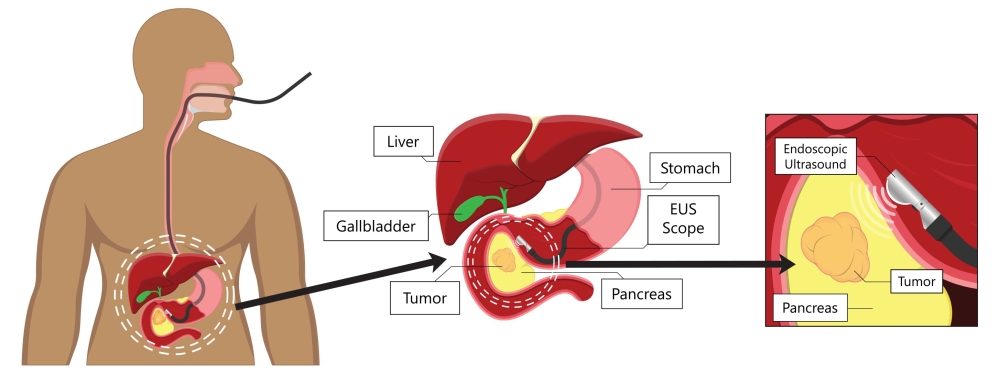Study: More research points to the benefits of pancreatic cancer screening
People with a family history of pancreatic cancer or those who have an inherited mutation that increases risk may benefit from yearly pancreatic cancer screening. Yearly screening may lead to early diagnosis and longer survival. (Posted 10/8/24)
Este artículo está disponible en español.

RELEVANCE
Most relevant for: People undergoing pancreatic cancer screening.
It may also be relevant for:
- people with a genetic mutation linked to cancer risk
- people with a family history of cancer


Relevance: Medium


Strength of Science: Medium-High


Research Timeline: Post Approval
What is this study about?
This study compared the survival of people at high risk of pancreatic cancer whose cancer was detected at screening compared to people from the general population who were diagnosed with pancreatic cancer and who were not undergoing pancreatic cancer screening.
Why is this study important?
Unlike colon cancer or breast cancer, pancreatic cancer does not have a routine screening test. Most people are tested only if they notice symptoms. While screening is not yet practical for everyone, some research has shown that screening people who are at high risk may detect cancer at an earlier when it is more treatable. See our XRAY review here.
This study takes this research further, beyond just finding the cancer earlier. This study looks at whether screening people who are high-risk helps them live longer if they develop pancreatic cancer.
Study details and findings
This study focuses on screening for pancreatic ductal (), the most common kind of pancreatic cancer for those at high risk.
The study found that people who are at high risk of pancreatic cancer benefit from yearly screenings. Cancers that are caught earlier are easier to treat, and because yearly screening caught cancers earlier it resulted in longer survival.
This study compared people in the Cancer of the Pancreas Screening (CAPS) program who developed pancreatic cancer to people in the general population. For the general population, researchers used the Surveillance, Epidemiology and End Results () database. is a commonly used database that collects and publishes U.S. cancer statistics.
- 1,731 high-risk people were enrolled in CAPS between 1998 and 2021.
- High risk was defined as people with:
- an in a gene (MHL1, , , or ), , , , , or .
- more than one close family member with pancreatic cancer.
- People in the study agree to have regular scans or tests to look for pancreatic cancer through yearly endoscopic ultrasounds (EUS) or MRIs.
Twenty-six people in the high-risk study group developed pancreatic cancer during the three-year study period. Of these:
- 16 had a family history of pancreatic cancer.
- 10 had an that increased their risk of pancreatic cancer.
- 6 were diagnosed at the start of the study.
- 20 were diagnosed over time after they started screening (an average of almost six years later).
The study team matched their records with 1,504 people in who had pancreatic cancer (the control group). Records were matched exactly on age, race and year of diagnosis.
Key findings include:
- The high-risk group had lower-stage cancers at diagnosis than the control group. For example, 27% in the CAPS group were diagnosed with 4 cancers, compared to 54% in the control group. More than half (18 of 26) of the people in the CAPS group had 1 or 2 cancers at diagnosis.
- The people in the high-risk group had smaller tumors at diagnosis compared to people in the control group (average size of 2.5 cm vs 3.6 cm).
- People in the high-risk group lived much longer after diagnosis: an average of 61.7 months (a little more than 5 years) compared to 8 months in the control group.
- The 20 people whose cancers were diagnosed after starting screening lived an average of 144 months (12 years) compared to 9 months for the control group.
- The likelihood of dying from pancreatic cancer within 5 years was 43% for the high-risk group compared to 86% for the control group.
National Comprehensive Cancer Network (NCCN) recommendations
For individuals considering pancreatic cancer screening, the NCCN recommends clinics that are experienced and routinely perform this screening.
The NCCN also recommends that such screening only take place after an in-depth discussion about the limitations. These include:
- Cost: Not all insurance plans cover the cost of these screenings.
- Unnecessary worry: These procedures can lead to a high number of non-cancer or other findings unrelated to cancer, such as cysts that may require follow-up procedures, and may cause anxiety and worry.
- Uncertainties about which groups of people receive the most benefit from screening.
Screening by endoscopic (EUS) involves passing an endoscope, a tube-like instrument with a light and a lens for viewing and an attached probe down the esophagus to the stomach (see image below). This allows doctors to look closely at the pancreas. EUS is performed as an outpatient procedure under light anesthesia.

EUS is generally safe when performed by an experienced healthcare team. However, there are some risks associated with EUS, including bleeding, infection and developing pancreatitis after the procedure.
For people with an in the following genes, the NCCN suggests consideration of pancreatic screening at the following times:
- Beginning at ages 30–35 years (or 10 years younger than the earliest pancreatic cancer diagnosis in the family, whichever is earlier).
- Beginning at age 40 years (or 10 years younger than the earliest exocrine pancreatic cancer diagnosis in the family, whichever is earlier).
or
- Beginning at age 50 years (or 10 years younger than the earliest exocrine pancreatic cancer diagnosis in the family, whichever is earlier).
- This is a new NCCN recommendation.
, , , , , or and a family history of pancreatic cancer in one or more close relatives on the same side of the family as the mutation:
- Beginning at age 50 years (or 10 years younger than the earliest exocrine pancreatic cancer diagnosis in the family, whichever is earlier).
- The NCCN does not recommend pancreatic cancer screening in people with these mutations when there is no close family history of pancreatic cancer.
American Society for Gastrointestinal Endoscopy (ASGE) Guidelines
In contrast to the NCCN, ASGE recommends that anyone with a or mutation, regardless of family history of pancreatic cancer, undergo annual screening for pancreatic cancer with MRI/MRCP or EUS, beginning at age 50 (or 10 years earlier than the earliest pancreatic cancer in the family).
What does this mean for me?
Pancreatic cancer is often found at later stages and is harder to treat. When pancreatic cancer is caught earlier, patients have more treatment options, often including surgery.
According to this study, screening may be worthwhile for people who are high risk due to genetic risk or family history.
This study did not look at screening for other high-risk groups such as people with other inherited mutations, diabetes or cigarette smokers.
If you have a family history of pancreatic cancer or have tested positive for a gene linked to pancreatic cancer, talk with your doctor about whether screening might be right for you. If you are eligible for screening, you might be offered one of a few tests.
Reference
Blackford AL, Canto MI, Dbouk M, et al. Pancreatic cancer surveillance and survival of high-risk individuals. JAMA Oncology. 2024;10(8):1087–1096. Published online July 3, 2024
Disclosure: FORCE receives funding from industry sponsors, including companies that manufacture cancer drugs, tests and devices. All XRAYS articles are written independently of any sponsor and are reviewed by members of our Scientific Advisory Board prior to publication to assure scientific integrity.
Share your thoughts on this XRAY review by taking our brief survey.
posted 10/8/24
- Based on my family history and genetics, what is my risk of developing pancreatic cancer?
- If I am at higher risk, do you recommend screening for pancreatic cancer?
- Do you offer screening for pancreatic cancer here? Which type of screening do you recommend for me and how often?
- How accurate are these screenings?
- I have not had genetic testing for cancer. Do you recommend testing for me, and if so, where can I have it done?
The following studies are looking at risk management for pancreatic cancer:
- NCT04970056: Pancreatic Cancer Early Detection for People at High Risk (PRECEDE). The study will collect clinical information, family history and samples (blood, saliva or cheek swab) from people and families at risk for pancreatic cancer.
- NCT02000089: Pancreatic Cancer Screening Study (CAPS5). The CAPS5 study is looking at screening for early cancer in people with an elevated lifetime risk of developing pancreatic cancer who are undergoing screening with endoscopic , MRCP or .
- NCT03250078: A Pancreatic Cancer Screening Study in Hereditary High-Risk Individuals. The main goal of this study is to screen and detect pancreatic cancer and precursor lesions in individuals with a strong family history or genetic predisposition to pancreatic cancer. Magnetic Resonance Imaging and Magnetic Cholangiopancreatography (MRI/MRCP) will be utilized to screen for pancreatic cancer or precursor lesions.
- NCT03568630: Blood Markers of Early Pancreas Cancer. This study looks at whether identifying biomarkers of early pancreatic ductal () could facilitate screening for individuals with higher-than-average risk, expedite the diagnosis in individuals with symptoms and substantially improve an individual's chance of surviving the disease.
- NCT03250078: A Pancreatic Cancer Screening Study in Hereditary High-Risk Individuals. The goal of this study is to use Magnetic Resonance Imaging and Magnetic Cholangiopancreatography (MRI/MRCP) to screen for pancreatic cancer in individuals with a strong family history or genetic risk .
Other clinical trials for pancreatic cancer screening and prevention may be found here.
Updated: 12/23/2024
The following organizations offer peer support services for people with or at high risk for pancreatic cancer:
- FORCE peer support
- Our Message Boards allow people to connect with others who share their situation. Once registered, you can post on the Diagnosed With Cancer board to connect with other people who have been diagnosed.
- Peer Navigation Program will match you with a volunteer who shares your mutation and situation.
- Private Facebook Group
- Virtual and in-person support meetings
- Join a Zoom community group meeting.
- LGBTQIA
- Men
- American Sign Language
- People of Color
- Spanish-speakers
- PanCAN
- Let's Win PC
- The Healing NET Foundation is a nonprofit organization for people with neuroendocrine cancers.
- The Neuroendocrine Cancer Awareness Network (NCAN) is a non-profit organization dedicated to raising awareness of neuroendocrine cancer and providing support for caregivers and people with NETs.
Updated: 08/23/2022